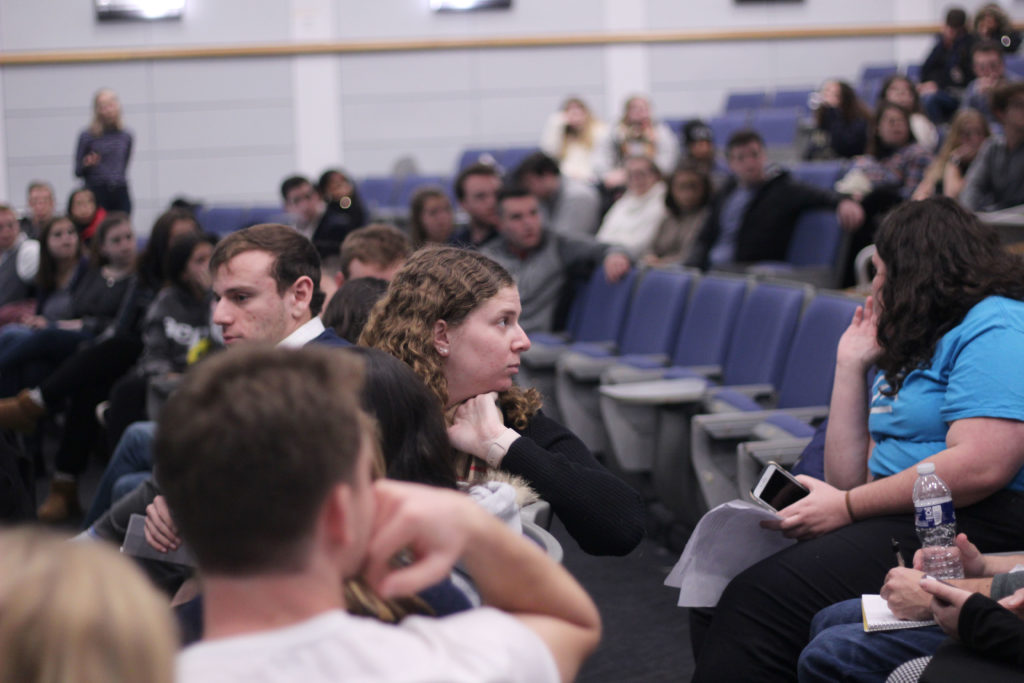Members of the Student Association hosted a community forum Tuesday to allow students to voice concerns about anti-Semitism on campus a week after an anti-Semitic video surfaced on campus.
About 100 students, SA members and leaders, and officials met in Funger Hall to share anecdotes of anti-Semitism they have experienced and to discuss what actions students and administrators should take in the aftermath of the incident. Students called on officials to share more information about the disciplinary actions that are being taken against the individuals involved in the incident.
Max Webb, the president of GW for Israel, called on the community to create “meaningful” and “systemic” change to combat anti-Semitism on campus in the aftermath of the video.
“For many students on this campus who have any connection to Israel, the comments made in that Snapchat video struck a different chord, a fear that we live with every day,” he said.
Webb said he and the students he represents as the group’s president don’t feel comfortable on campus, adding that anti-Semitic comments, like the ones made in the video, could lead to violence if treated as acceptable speech.
“Every act of persecution against Jewish people didn’t begin with pure violence, but rather rhetoric that was slowly accepted as normal over time,” he said.
[gwh_image id=”1104376″ credit=”Lillian Bautista | Contributing Photo Editor ” align=”none” size=”embedded-img”]SA Sen. Marietta Richman, MISPH-U, guided the town hall along with two other student leaders Tuesday.[/gwh_image]
Junior Emily Goldberg said officials have taken actions that have contributed to the problem of anti-Semitism on campus. Leaders at the Colonial Inauguration she attended before her freshman year performed a skit about a Jewish family who rejected their daughter’s partner because he wasn’t Jewish, she said.
Goldberg said her roommate later asked her if she was allowed to be friends with her roommate because she wasn’t Jewish.
“Whoever created that was from the University, already making me go to school here with a target on my back,” Goldberg said.
Sophomore Rachel Kraft said the girl in the video – whom The Hatchet is not identifying for privacy concerns – apologized for what she said in the video, adding that the two of them had a conversation about why her comments were hurtful to the Jewish community.
“I think that talking to her like a person and not yelling at her in anger really got through to her in a way that I don’t think anger could have,” she said.
Christy Anthony, the director of the Office of Student Rights and Responsibilities, fielded questions from students about how officials will decide on disciplinary action for the two individuals involved in the video.
She told forum attendees that she “cannot provide any information on individual students’ cases to anyone outside,” citing both federal law and a moral commitment to students.
“One of them is to uphold federal privacy laws and it provides really clear guidance on how we disclose and when we disclose any student’s educational record of any kind,” she said about the reasons she cannot disclose any information. “But a more significant obligation for me are the ethical obligations that have students participate.”
Hannah Thacker, The Hatchet’s contributing opinions editor, said that in spite of legal and ethical reasons for refusing to shed details on the punishment, students may view administrators’ actions as refusal to address the problem.
“While I understand that you can’t speak about specific cases, you can’t really talk about what’s going on with anything, I want you and other officials to know that it’s perceived as University silence and that silence is deafening,” she said.





